Recent Fire Damage Posts
Be careful when you use a space heater
2/19/2021 (Permalink)
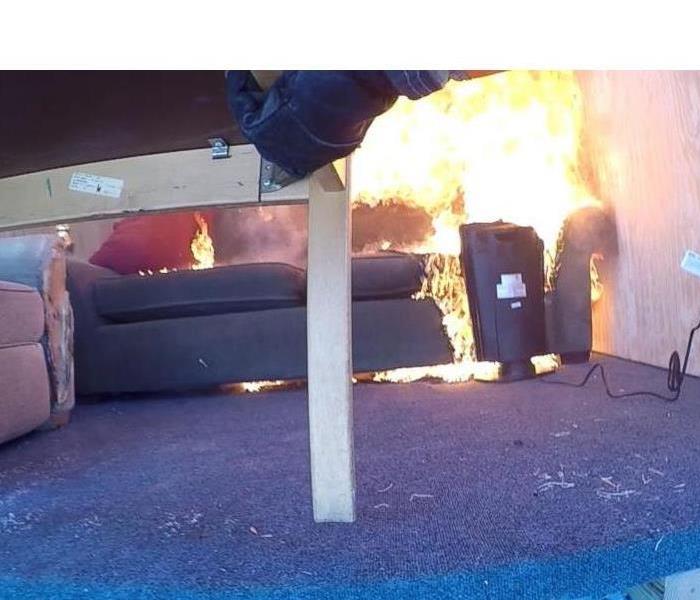 You can prevent a fire from a space heater if you follow these steps.
You can prevent a fire from a space heater if you follow these steps.
As the temperatures drop lower and cold weather rolls in to stay for awhile, you’re probably breaking out the space heaters to warm up your home or business. While space heaters provide wonderful warmth during the colder months, they also can be safety hazards if they aren’t properly set up and monitored to ensure they don’t pose any risks to you or your home. A space heater fire is never on anyone’s agenda, so we recommend following these 5 space heater safety tips to avoid any unwanted fires from occurring:
- Carefully place your space heater at least 3 feet away from flammable objects. If any objects come in contact with the space heater’s electric heating face or a hot surface, it poses a serious fire risk. As a general rule, never sit or drape anything over your space heater, don’t set it near rugs, furniture, bedding, clothing, window treatments, or other flammable materials. Also, make sure that it’s sitting on a level surface so that it doesn’t accidentally fall or tip over.
- Don’t use extension cords. Plug your space heater directly into an outlet. There’s a much higher chance of your space heater overheating or otherwise malfunctioning if it’s plugged into an extension cord or an outlet strip. Minimize these dangers by plugging your space heater directly into an outlet that has the power capacity necessary to fire it up and keep it running.
- Unplug it when you’re not using it. This should go for almost all appliances, but it’s especially relevant for your space heater. When you’re not using your space heater, you should first turn it off and then you should unplug it. Having a space heater running while you don’t want it to be running poses a fire hazard as well as a waste of energy.
- Clean, inspect, and maintain your space heater. On a regular basis, you should clean your space heater and wipe it down to avoid dispersing dust and other allergens throughout your house. You should also carefully monitor your space heater to ensure that it’s working as it’s supposed to and nothing wonky is happening. If anything seems out of order, turn it off and unplug it right away until a professional can inspect it and you can safely run it again. Alternatively, you can just dispose of it and purchase a new space heater.
- Don’t run your space heater in the bathroom or a basement. Space heaters should never be run in places that are humid or wet because space heaters are not meant to be wet. Don’t handle your space heater if your hands are wet or you just got out of the shower. The electricity from the space heater could run through the water and shock you. This is dangerous and should be avoided at all costs.
Is your Fireplace ready for the season?
12/17/2020 (Permalink)
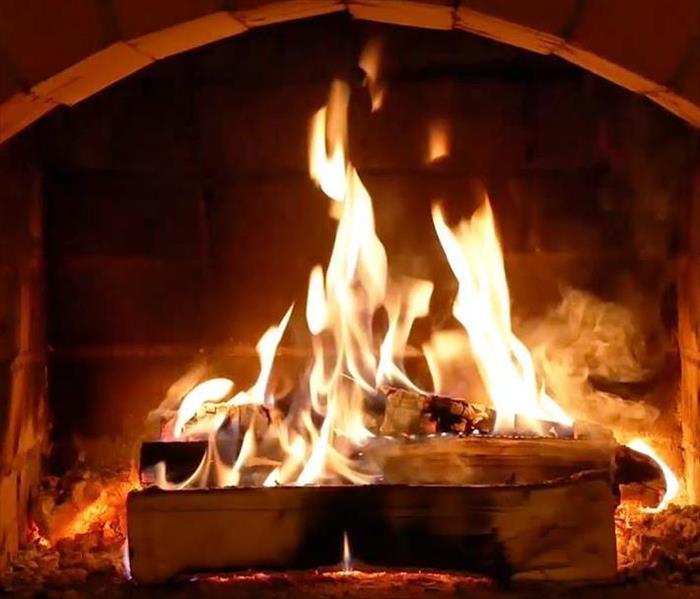 Think safety before you start a fire.
Think safety before you start a fire.
What to Check Before You Light a Fire
Clean the fireplace area. Be sure all flammable materials, such as drapes, magazines, books, clothing and home decor items, are well away from the fireplace. If you have a mantel, check that nothing is hanging off of it.
Check the chimney. Make sure the protective liners of your chimney are in good working order. Search for a certified professional to help clean and inspect your fireplace and chimney. When looking for a professional, you may want to ask these questions:
- How long has the professional been in business?
- Does the professional have references?
- Do they have any unresolved complaints filed within the city or state?
- Do they or the company they work for carry valid business liability insurance?
- Does their company guarantee a CSIA Certified Chimney Sweep will be there for the inspection?
Clear the air. Be sure the room where your fireplace is located has been well ventilated and is free of any flammable fumes and gases.
How to Light a Fire
When you’re ready to set up and light the fire, be sure to follow these steps:
- Step 1: Place two medium sized pieces of firewood on the metal grate approximately 6 inches apart.
- Step 2: Crumple sheets of newspaper (tinder) in between the two pieces of firewood and cover the tinder with kindling.
- Step 3: Place one to two more pieces of firewood on top of the other logs. Make sure there is enough space for ventilation.
- Step 4: Check that the fireplace damper (vent) is fully open.
- Step 5: Start off by twisting a single sheet of newspaper and light it while holding it as high up as possible in the fireplace. Be careful not to burn yourself. This can help establish a good draft in the chimney as the heat rises.
- Step 6: Slowly light the kindling with the burning paper.
- Step 7: Once a fire is established, add firewood as needed and make sure to keep flames visible below the fireplace opening.
Fire Safety Tips
11/2/2020 (Permalink)
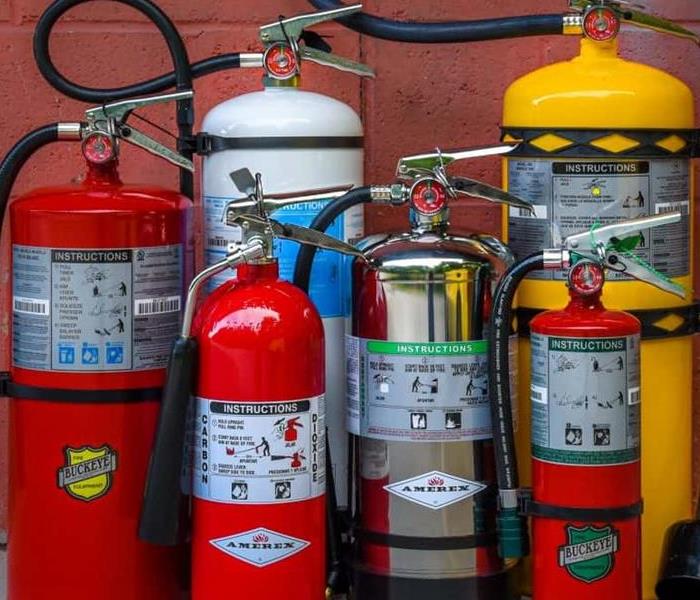 Always have a fire extinguisher ready for any disaster that may happen.
Always have a fire extinguisher ready for any disaster that may happen.
SERVPRO of Decatur/Forsyth is always here to help if you have a fire damage.
Fire Safety Tips:
Check all electrical appliances, cords and outlets monthly.
Carefully read the directions for proper use of space heaters, electrical cords.
Be vigilant in the kitchen. Always keep a close eye on food while cooking. If you leave the kitchen, turn the stove off. Take an oven mitt or spoon to remind yourself of the food left on the stove.
Keep fireplaces kept clean and free of paper, wood or flammable materials that can escape while burning or left unattended.
Always keep matches and lighters out of children’s reach.
Use candles safely by keeping them away from children, pets, furniture and curtains.
Test your smoke alarms monthly and change the batteries twice a year (I.e. Spring & Fall)
Practice fire drills at home and work
Always remember to PASS
Pull the pin at the top to break the temper seal
Aim the extinguisher low, pointing the nozzle at the base of the fire
Squeeze the handle to release the extinguishing agent
Sweep the extinguisher from side to side, continuing to aim at the base of the fire until it appears to be out
Did you know there are 4 types of fire extinguishers?
Water extinguishers
Water extinguishers are filled with regular tap water. The best way to remove heat is to dump water on the fire, however depending on the type of fire, this is not always the best option.
Foam extinguishers
The foam has a blanketing effect that knocks down the flames, smothering and cooling them. Hopefully preventing re-ignition of the flammable vapors by sealing the surface of the solution.
Dry Power extinguishers
Dry power fire extinguishers interrupt the chemical reaction of the fire by coating the fuel with a thin layer of powder, separating the fuel from the surrounding oxygen.
Carbon Dioxide (C02) extinguishers
C02 extinguishers contain carbon dioxide, a non –flammable gas. C02 is heavier than oxygen so these extinguishers work by displacing or taking away oxygen from the surrounding area. C02 is also very cold so it also works by cooling the fuel. C02 is non corrosive and on conductive.
Our SERVPRO team can help you with your fire damage anytime!
11/2/2020 (Permalink)
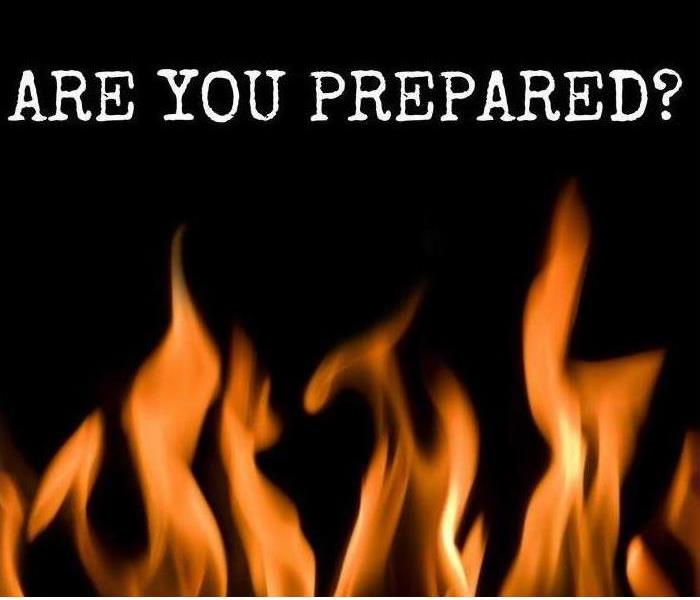 Are you prepared?
Are you prepared?
Steps to Help Make Fire Cleanup in Your Home More Effective
A sudden flare-up in an area like the kitchen is likely to leave surfaces or fixtures such as cabinets, doors, and even the ceiling scorched or caked with soot. You can fix these damages in many ways, including replacing the degraded materials. However, you are more likely to prefer a cost-friendly solution. Fire cleanup offers that solution when done correctly.
What cleanups can achieve
Before choosing a solution such as fire cleanup in your home, it is essential to establish whether it is appropriate. Cleaning can help you deal with blackened or stained surfaces as well as bad odor. It can also restore charred surfaces effectively if the charring is not too deep. However, you cannot restore damages that compromise the structural integrity of a material.
Home-based solutions
For minor incidents, you may be able to do the cleanup on your own. Knowing particular tips can help you achieve the right outcome. To deal with surface discoloration and soot from surfaces such as walls, use warm water and detergent. Cleaning products containing TSP, tri-sodium phosphate are great for reducing smoke odors so you can look for cleaning agents containing that agent. Here is the caveat. SERVPRO techs ALWAYS pre-test detergents and cleaning agents before applying to surfaces. Often, DIY'ers smear and stain and exacerbate the fire and soot damage. Try calling us first.
Using Advanced Cleaning Procedures
While conventional methods can be useful at times, in many cases the damages left are too extensive, thus requiring advanced cleaning methods. Otherwise, you would have to replace or resurface the affected materials. Dry ice blasting and soda blasting are two great advanced cleaning options our SERVPRO teams use. They rely on air pressure to drive the abrading material over the surface removing thick soot or charring. Both are also mildly abrasive, so they do not cause additional damages to the surface.
To clean or not to clean?
For surfaces with unique properties such as acoustic tiles or other porous materials, wet cleaning can cause problems, including dissolving the textured surfaces. Our SERVPRO technicians use Peroxide Active cleaning, which helps remove all soils while retaining the properties of the material. Often, inexpensive, porous materials should be removed and discarded.
We use specific tools to combat fire damage. Call the professionals
11/2/2020 (Permalink)
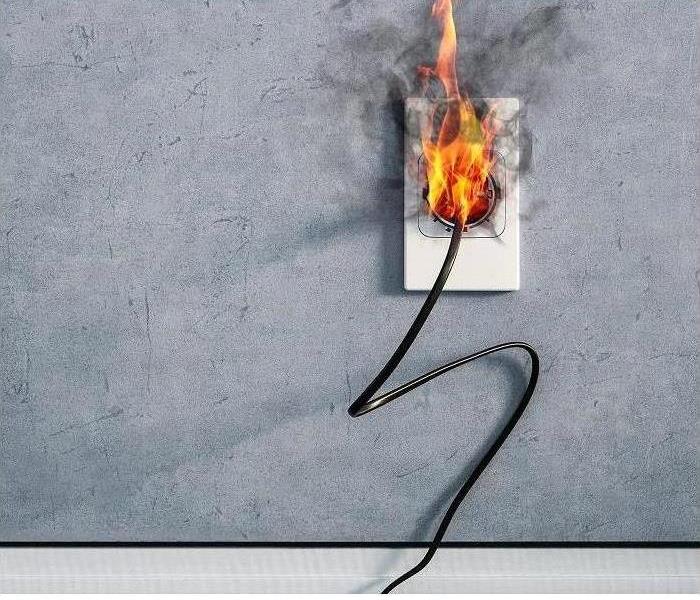 This can happen to anyone.
This can happen to anyone.
The chill of winter can cause some people to use devices that are designed to warm up their house, but unfortunately, they can sometimes cause fire damage to your property if left unattended. Generally speaking, devices that plug into a wall outlet and use a heating element of any kind should not be left on their own or else they turn into a fire hazard. However, this does not mean you cannot use space heaters or other devices that are similar; it only means that you should use them responsibly and with caution. Sometimes, despite your best efforts, accidents happen and when they do it is reassuring to know that expert help is close by and available to call.
When we receive your call, we make it our priority to arrive at your property promptly so we can remediate the fire damage inside your Nashua home before it causes further loss. Fire damage should never be left for an extended amount of time before remediation occurs. Many people recommend that you wait and consider all of your options before making an impactful decision, however, it is actually the opposite of what should be done when home damage of any kind occurs. Due to the extreme heat during a blaze, in combination with the spread of soot and ash, many objects inside your home can become discolored. The longer it takes for remediation to occur, the worse this discoloration can become.
Here at SERVPRO, our techs bring advanced equipment with them to your home. We use specific tools to combat fire damage, including hydroxyl generations and thermal foggers to handle the malodorous smell that fire causes. Our SERVPRO technicians can then begin to clean up any charred or destroyed objects in your sitting room, such as burned curtains or books. Additionally, SERVPRO can remove the soot left behind by the fire inside of your home with chemical solutions that separate the particles from the surface.
Black soot on your walls can be caused by burning candles in your home.
12/10/2019 (Permalink)
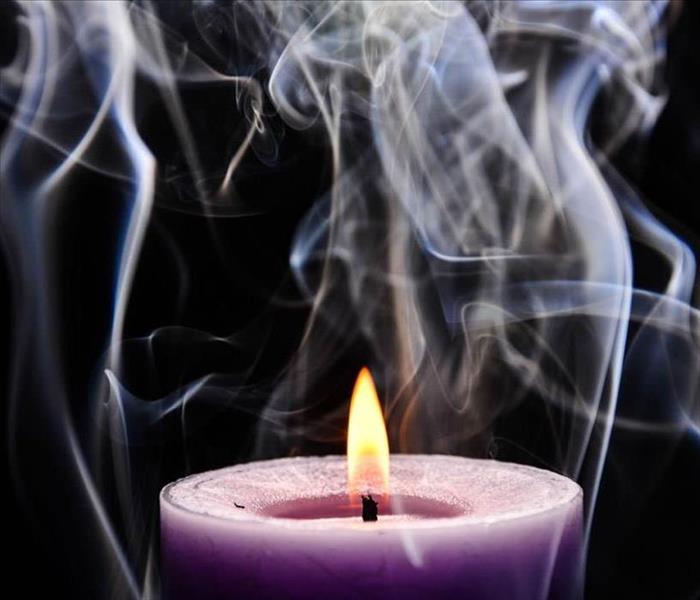 Smoke damage in your home can be caused by burning candles.
Smoke damage in your home can be caused by burning candles.
Insurance and commercial property management companies have noted an increase in claims due to black spot stains on ceilings, walls, furniture, content and HVAC filters from previously unidentified sources. The problem is referred to as “black soot deposition” (BSD) and, as research indicates, it is frequently caused by a common household decorative item.
There is no evidence of a sudden or accidental source for BSD, such as malfunctioning furnaces, gas water heaters, cigarette smoke or cooking by-products. Until recently, there was little compelling evidence to assign proper blame for the source of BSD. Tests have confirmed, however, it is very possible decorative scented candles are a primary culprit.
Low-quality candles often to blame
Research indicates increased BSD is often the result of candle manufacturers adding additional fragrance oils to their products, along with improper wick trimming by customers. Many fragrance oils are not suitable for combustion and do not burn cleanly. It also appears that many amateur candle-makers have entered the expanding market to capitalize on the current popularity of candles without proper training or experience. The outcome is an abundance of low-quality candles burning in many homes and a corresponding increase in the frequency of indoor soot deposits.
Potential dangers to structure and health
The number of aromatic candle manufacturers, professional and amateur, grows each year. A number of these introduce candles to their product line without the knowledge necessary to produce a safe and clean-burning product. Chemical testing provides conclusive evidence that emissions from some burning candles contain more than twenty volatile organic compounds, lead and a significant amount of carbon.
Burning scented candles inside homes, apartments and commercial buildings can present serious health hazards to those living and working there. It can also mean damage to ventilation systems, furnishing and content. Evidence suggests breathing even one micron of particulate soot can be hazardous. The Environmental Protection Agency (EPA) and American Lung Association (ALA) have determined breathing particulate matter 2.5 microns or smaller is detrimental to human health. These particles are dangerous because they are inhaled deeply into the lungs, causing irritation and respiratory problems. Those at extra risk include people with heart or lung disease, children and the elderly.
Pumpkin Display SAFETY
10/16/2019 (Permalink)
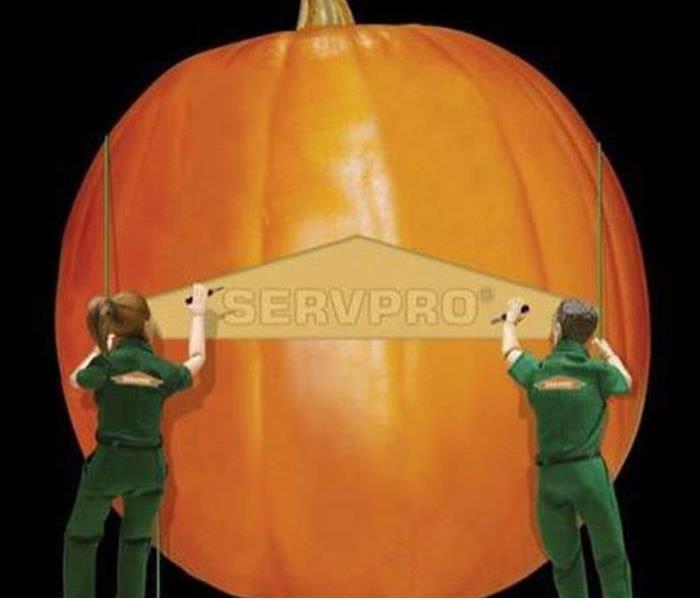 Have a safe and fun Halloween.
Have a safe and fun Halloween.
Deck, Patio, or Porch Safety
When our jack-o'-lanterns are ready for display, we often set them out on decks, patios, or porches. In so doing, we may be unwittingly inviting rodents and stinging insects to the home, as these pests are drawn to the now exposed soft inner flesh of the jack-o'-lanterns. Of the two, the insects are the more dangerous if you're allergic to hornet or yellow jacket stings. To counteract the threat, set out insect traps.
As carved pumpkins begin to rot (they can do so quite rapidly), the issue of their slipperiness again becomes a cause for concern. The problem is now exacerbated by the proximity of the carved pumpkins to doors leading inside from decks, patios, or porches. One morning, without watching where you're going, you could open the door, begin to descend the porch stairs, step on a piece of rotted jack-o'-lantern flesh, and take a nasty spill. Worse yet, a stranger could take a similar spill on your porch and sue you.
Illuminating Carved Pumpkins
Further safety issues arise when your intent is to illuminate carved pumpkins. Candles have been used traditionally to illuminate jack-o'-lanterns. But the open flame of a candle poses a fire hazard. If you're going to illuminate carved pumpkins on your deck, patio, or porch using candles, take these safety precautions:
- Don't leave them unattended.
- Be thorough in your leaf removal efforts, so there'll be less flammable material around to catch fire.
- Don't leave them on your deck, patio, or porch during trick-or-treating hours, as kids' costumes may be flammable.
A safer option for illuminating jack-o'-lanterns is to use glow sticks, which can be bought at party supply stores. With glow sticks, there are no flame, cord, or batteries to worry about, and they're waterproof. To activate them, bend them to break the internal glass capsule.
Make sure you change your furnace filter this season.
10/15/2019 (Permalink)
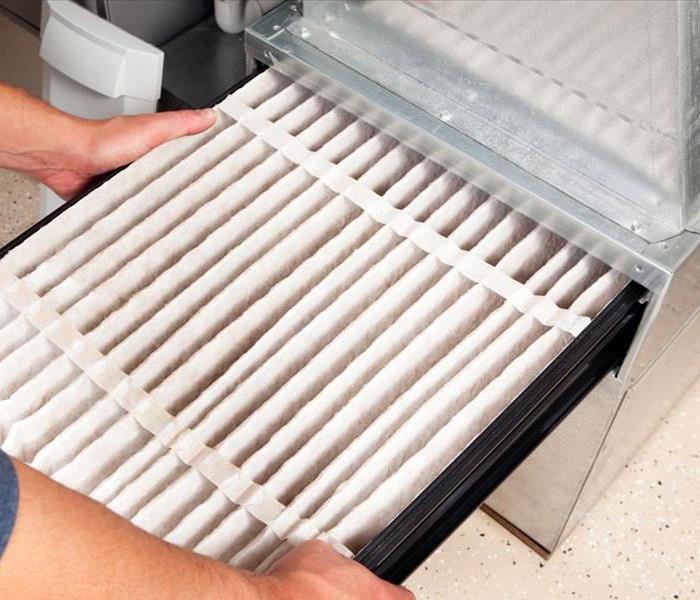 Change your filter regularly!
Change your filter regularly!
Changing your furnace filter regularly ensures the air in your home will remain clear of dust and other contaminates. If you don’t change your filter, it will fill up and not be able to trap new particles. A full filter will not be able prevent additional dirt and debris from circulating through your home, causing your family to breathe more dust and allergens on a daily basis. Additionally, a full furnace filter causes the motor on your furnace/hvac system to have to work harder, and it will subsequently become less efficient. Even a fire could happen.
Frequently Open Windows and Doors
Windows and doors left open allow dust and contaminates from the outside air to accumulate in your home and put an added layer of filth on your filters. If your windows and doors are often left open, one and two-inch filters will need to be replaced monthly, four-inch filters every two months and five-inch filters every three months.
Animals
If you have furry pets living in your home, this will shorten the life of your furnace filter. For one animal living at home, you should change your filter every two months for a one or two-inch filter, four months for a four-inch filter and six months for a five-inch filter.
The more animals living in your home, the shorter your filter is going to last. Having multiple animals means you should change a one or two-inch filter out every month, a four-inch filter every two months and a five-inch filter every three months.
Smokers
If you have smokers in your home, this will have an effect on your filter as well. The more smokers you have, the shorter your filter life will be. If you have only one smoker in the house, you can get away with changing out a one or two-inch filter every two months, a four-inch filter every four months and a five-inch filter every six months. If you have multiple smokers in the house, you’ll need to adjust those numbers to once a month for one to two-inch filters, two months for four-inch filters and three months for five-inch filters.
Heater Fan
The frequency at which your heater fan is running will affect how often you need to replace your filter. If your heater fan is on constantly, you’ll need to change your filter each month, having it on sometimes will be every two months and never having it on can be every three months.
Dust
Excess dust is another factor that can shorten the life of your furnace filter. If your house is one that has a lot of dust, you’ll need to change one and two-inch filters out every month, four-inch filters every two months and five-inch filters every three months.
Allergies
If anyone in your home has allergies, they will benefit from more frequent air filter changes.
Staying mindful of the factors that play a role in the air quality inside your home is a good measurement for how often your furnace filters need to be replaced. Keeping new filters in your furnace will help ensure that your furnace runs smoothly and efficiently and, most importantly, the air you and your family breathes is as clean as possible.
Make sure your fireplace chimney is clean this season!
10/7/2019 (Permalink)
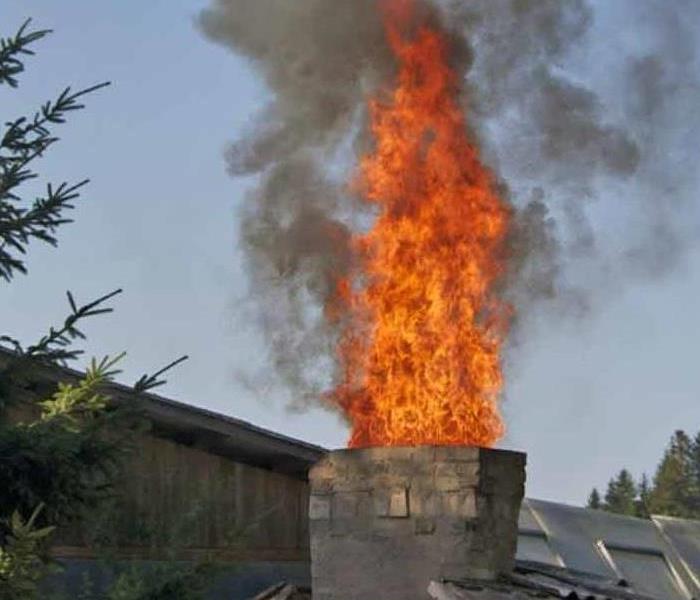 Prevent a chimney fire by having a yearly cleaning done.
Prevent a chimney fire by having a yearly cleaning done.
When Do I Need A Chimney Inspection?
If you haven’t had your chimney inspected in a year or more, if you are having any performance issues with your chimney, fireplace or heating system or if you have recently purchased the home you should schedule an inspection. Don’t wait – waiting almost always results in additional repairs, and unfortunately sometimes in property loss. Every year in the US homeowners lose over 200 million dollars as a result of continuing to use unsafe systems.
Another important time to get your venting systems inspected is when you have upgraded or changed heating systems or added a stove or insert. An inspection will make sure that your chimney, lining and venting systems are adequate and in working order to handle the new changes.
If you have not used your fireplace in a long time, pests may have built nests that could clog your flue or chimney chamber. Winter freeze cycles and moisture combine to take an annual toll on masonry and liner materials too. Over several years the deterioration will eventually require attention. Normal wear and tear that is left unchecked will affect the performance of your system. The longer the defects go without being addressed, the more expensive the repairs are likely to be.
Bottom line is – staying on top of your systems is not only the smartest and safest choice, it ends up being the most cost-effective too.
If you ever need cleanup after a fire damage give us a call anytime 24/7! (217) 428-2371
Beware of dangers after a house fire.
10/2/2019 (Permalink)
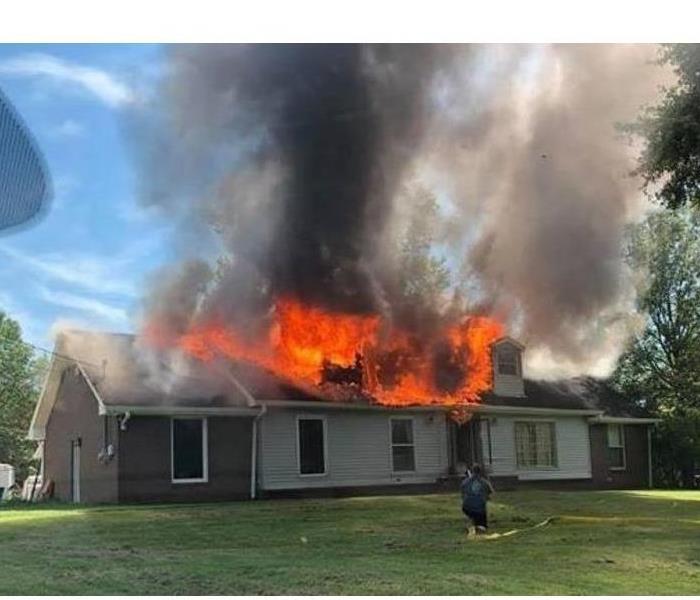 Call us for cleanup after a house fire. We are here to help!
Call us for cleanup after a house fire. We are here to help!
If your home has recently suffered from a horrible fire, don’t hesitate to take action in calling SERVPRO of Decatur/Forsyth for emergency fire damage restoration services. The smoke and soot byproducts will only spread over time and engulf additional building materials if they aren’t treated right away.
But what is worse about the smoke damage is that it can cause serious health risks. In fact, the smoke can also linger for up to several weeks following the fire. To make matters worse, these thick layers of soot and smoke will be difficult to remove, thus, requiring professional fire cleanup products.
All of the following include the health risks that can occur after a house fire:
- Breathing issues
- Skin issues
- Eye irritation
- Long-term health risks
Don't wait give us a call anytime 24/7 for any services you may need! (217) 428-2371
Fall is here! Here are some safety tips for a bonfire.
9/26/2019 (Permalink)
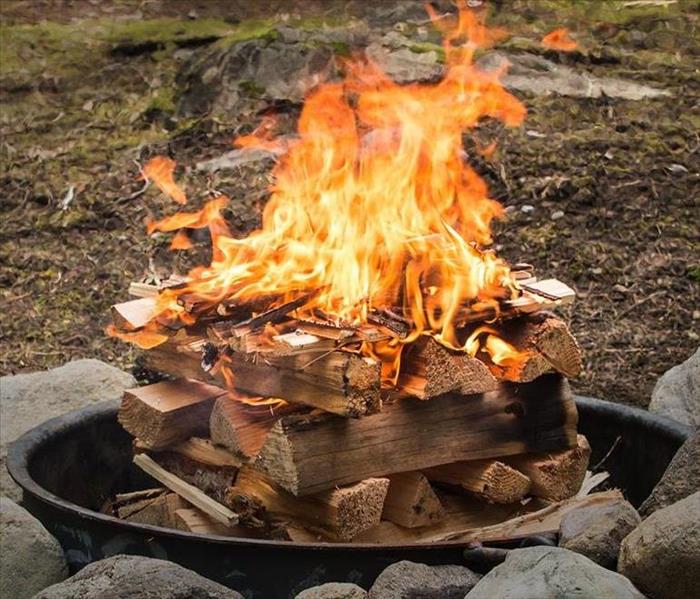 Be safe!
Be safe!
TEACH CHILDREN HOW TO BE FIRE SAFE AROUND A CAMPFIRE OR BONFIRE.
- Assume it’s hot – teach your children to assume anything and everything around a fire is hot. Even the metal on the chairs we sit on can become hot enough to cause a first-degree burn.
- Keep a safe distance – teach your children to always keep a safe distance from the fire, unless they are roasting marshmallows under the direct supervision of an adult.
- No horsing around near the fire – Accidents are more likely to happen when horsing around is involved. Keep it away from the fire.
- Don’t poke at or throw anything into the fire – Do not allow your children to poke anything into the fire or throw anything into the fire or someone is likely to get hurt.
- Teach them what to do if they ever catch on fire–stop, drop and roll
KEEP YOUR BONFIRE/ CAMPFIRE SAFE
Choose a responsible adult not consuming alcoholic beverages to keep the fire safely contained at all times.
- Never leave a bonfire unattended.
- Pay attention to the wind direction and strength.
- Keep it safe, small, and manageable.
- Add pieces of wood to keep it burning steadily, as opposed to making the campfire bigger.
SERVPRO can clean up any Fire Damage!
8/20/2019 (Permalink)
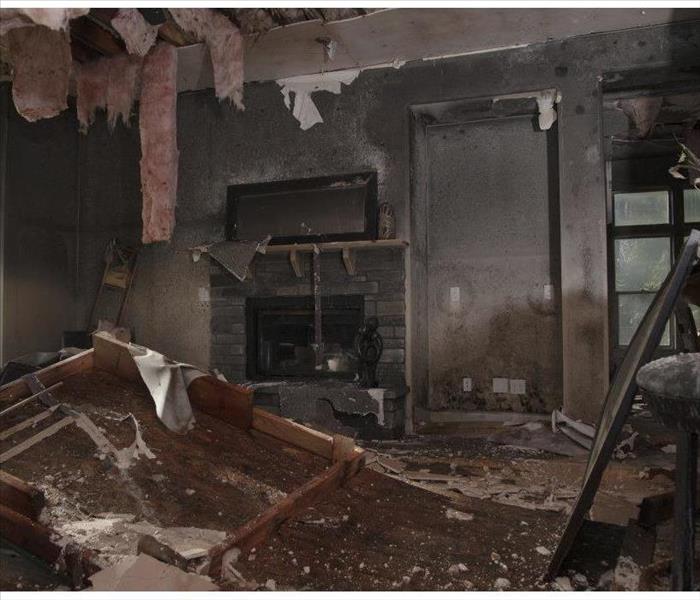 We can clean up after any fire.
We can clean up after any fire.
As if dealing with house fire and smoke damage wasn't enough, once the initial danger has passed, you also have to contend with the resulting soot that may have spread throughout your home. You'll quickly discover that soot is an eyesore that's very tough to clean, but you may not have considered the hidden dangers of soot.
Learn more about the basic science of soot, its physical properties and the hazards poor clean-up can pose so you can fully protect your home and family in the aftermath of a fire.
If it goes untreated or improperly cleaned, tiny particles of soot can be inhaled deep into the lungs. These toxic particles can cause breathing issues, including aggravated asthma, bronchitis and more severe respiratory illnesses that can restrict your ability to carry out normal activities.
To avoid health risks and restore your home to its former stain- and odor-free glory, focus on achieving complete, thorough and proper cleaning of all soot-affected areas.
SERVPRO of Decatur/Forsyth can clean up any fire damage! Give us a Call today!
(217) 428-2371
Make sure you always clean your dryer vents.
7/10/2019 (Permalink)
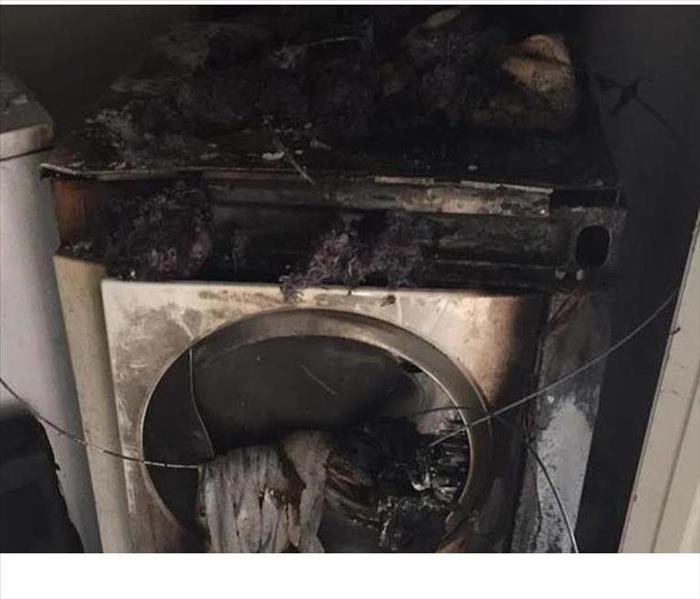 Don't let this happen to you!
Don't let this happen to you!
Signs that you should clean your dryer vents
Your first hint that you need to check your vents is when your clothing doesn’t dry after a normal drying cycle. If you encounter any other issues, contact a professional right away to inspect your venting.
Look out for the following signs of a clogged dryer vent:
- A musty odor is discovered in the clothing following the drying cycle
- Clothes seem unusually hot to the touch
- Excessive heat is noticed in the room in which the washer and dryer are operated
- The dryer vent hood flap does not open properly when you use the dryer (this is the slitted vent opening to the exterior of your home)
- Debris is noticed within the outside dryer vent opening
- Large amounts of lint build-up in the lint trap during each cycle
- Odor noticed from dryer sheets used during the drying cycle
How to prevent a dryer fire
You can do your part as a homeowner to prevent a dryer fire taking place in your home through proper installation, cleaning, and maintenance. Even if your dryer seems to be running fine right now, it’s better to be safe than sorry.
Take these steps to prevent a dryer fire:
- Read the manufacturers’ instructions and warnings upon installation and be sure that your dryer is installed by a knowledgeable professional and that the correct electrical plug and outlet are used
- Clean the dryer lint filter before and after each load of laundry
- Clean the filter with a nylon brush at least once every six (6) months or more often if it becomes clogged
- Completely clean lint out of the vent pipe every three (3) months
- Check occasionally through the venting system behind the dryer to ensure it isn’t damaged
- Put a cover on outside wall dampers to keep out the elements
- Ensure the outdoor vent cover opens when the dryer is on
What can you do right now?
- Take a look inside the venting from the outside of your house
- Check your lint traps inside the dryer
SERVPRO of Decatur/Forsyth is always here to help when a disaster strikes!
Be safe starting a fire!
7/9/2019 (Permalink)
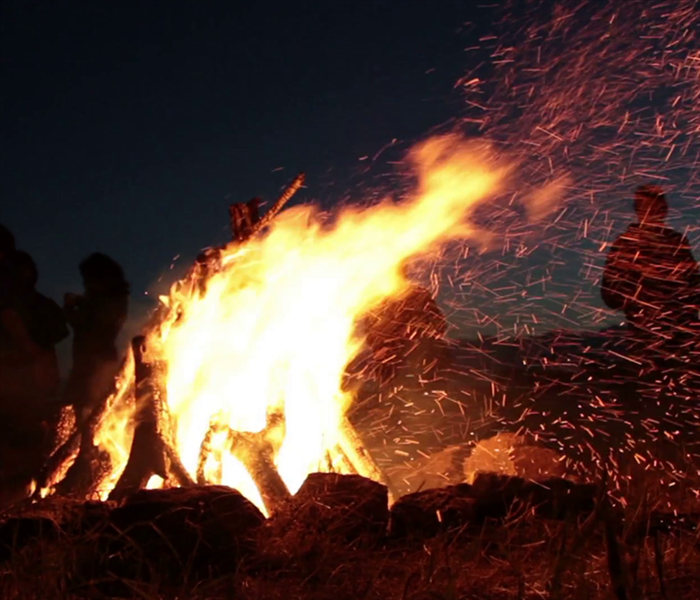 Safety first!
Safety first!
How to Safely Ignite the Fire
- An adult should always be present during open burning and children and pets should be kept at a safe distance away.
- Use paper and kindling to start a fire and add progressively larger pieces of wood. Parts of a leftover Christmas tree may also be used.
- Never use gasoline, kerosene or any other flammable liquid to start a fire! The risk of personal injury in these cases is very high.
- Burn one small pile at a time and slowly add to it. This will help keep the fire from getting out of control.
- Select a location away from utility lines.
Fires Must be Attended Until Completely Extinguished
Do not leave your fire burning unattended. This is a reason to revoke your burning permit.
Fire Control Tools and Water Supply Must Be Present
The water supply can be a pressurized fire extinguisher, a pump can or garden hose, and be sure to test it out before igniting the fire to be sure it works properly. Also, if relying on a garden hose double-check that the water supply is turned on and that there are no cracks in the hose itself. You are required to have a water supply and fire control tools on hand.
Watch the Wind: Be Prepared to Extinguish All Open Burning
It is unsafe to burn during high winds. Use common sense and don’t wait for the fire department to contact you that is has become unsafe to burn. Sudden wind change is the how most open burning gets out of control.
Don’t Delay a Call for Help
If for some reason, the fire should get out of control, call the fire department immediately. Use the utmost caution to prevent injury to yourself or family members or any damage by fire to your home.
Firework safety tips
6/18/2019 (Permalink)
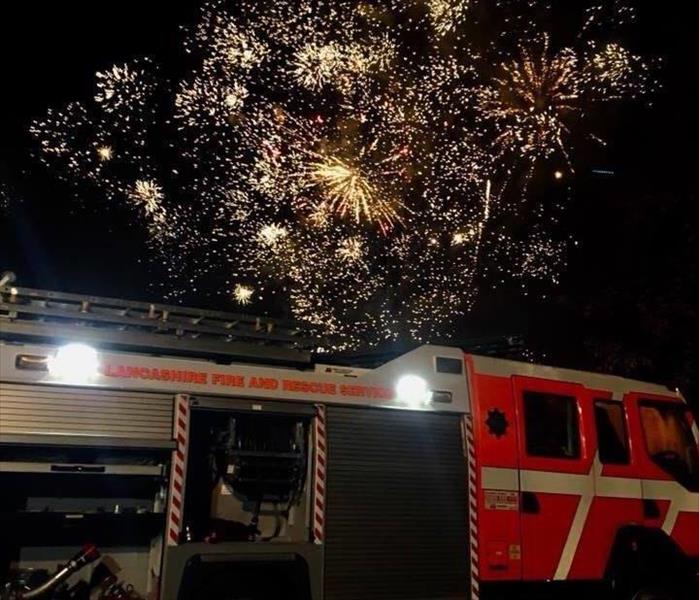 Follow these Firework Safety Tips to avoid an unwanted disaster!
Follow these Firework Safety Tips to avoid an unwanted disaster!
While you are enjoying your grilling, family time, and fireworks, take time to remind your kids what this holiday is about. The lighting and display of fireworks came with a price to many men and women sacrificing for their kids and future generations. Remain safe if your family tradition includes lighting fireworks.
Here are 10 fireworks safety tips you should use and teach to your kids.
- Fireworks packaged in brown paper are made for professional displays – avoid buying.
- Always have an adult supervise fireworks activities, especially with sparklers.
- Back up to a safe distance immediately after lighting fireworks.
- Never point or throw fireworks at another person.
- Keep a bucket of water or a garden hose handy in case of fire and to douse used fireworks before discarding in trash.
- Never allow young children to play or ignite fireworks.
- Never carry fireworks in a pocket or shoot them off in metal or glass containers.
- Never try to re-light or pickup fireworks that have not ignited fully.
- Never place a part of your body directly over a firework device when lighting.
- Make sure fireworks are legal in your area before buying or using them.
BE SAFE this holiday! Fireworks can be a fire hazard and can burn buildings, things and even you! SERVPRO of Decatur/Forsyth wants you to enjoy this 4th of July the safe way!
How to Pick a Campfire Spot
6/18/2019 (Permalink)
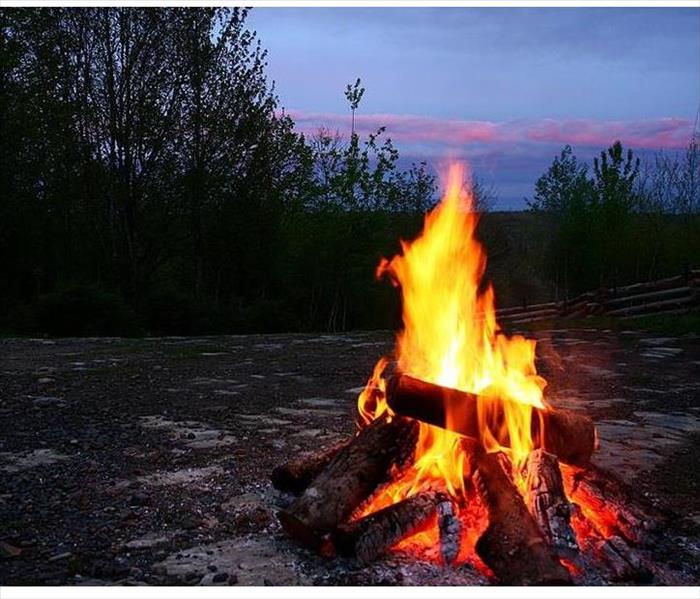 Campfires can be nice and relaxing if they are started in a suitable spot!
Campfires can be nice and relaxing if they are started in a suitable spot!
Picking a suitable campfire spot is crucial to maintaining a safe fire and preventing wildfires.
Be sure to evaluate the site before starting a fire. If the area is brushy or extremely dry, you might want to avoid building a fire altogether. These types of conditions are perfect for igniting wildfires.
Another important thing to remember? Always check with the campground operator or local agency to make sure fires are permitted in the area.
If fires are allowed and conditions are safe, follow these tips to choose a campfire spot:
Look for an existing fire pit or ring. If you can’t find one, choose a site with a rock or dirt surface.
Avoid areas with fuel for your fire, like moss, logs, or decaying leaves.
Build your fire at least 15 feet away from trees, tents, chairs, or any other debris.
Select a site that’s sheltered from high winds.
Don’t forget to look up – find an area without any overhanging branches.
If you have any questions, contact your campground ranger. Fire safety is their top priority and rangers can help you determine whether a pit or site is suitable for a campfire. It’s always better to be safe than sorry!
Candle Burning Safety
6/10/2019 (Permalink)
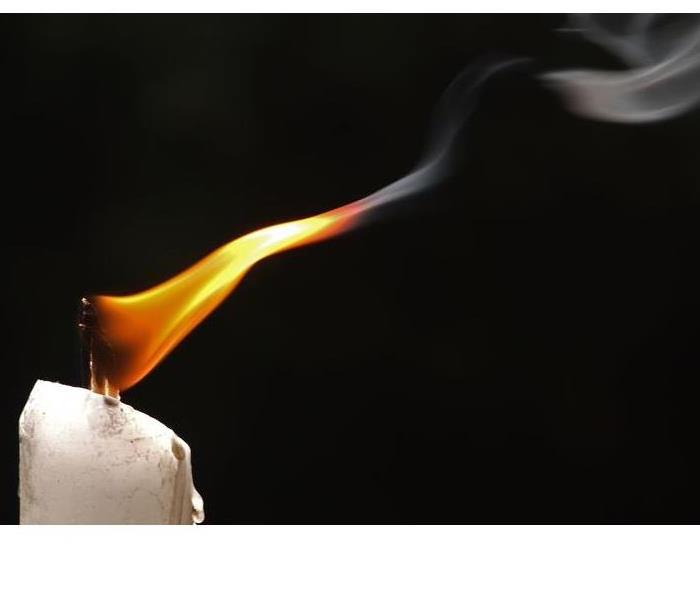 Never leave a candle burning unattended
Never leave a candle burning unattended
How many house fires are caused by candles in the U.S. each year?
Candles cause an estimated 15,600 house fires, 150 deaths, and 1,270 injuries each year.
Why are candles so dangerous?
A candle flame may be small, but you should treat it as you would any other flame – with care. Candles turn to liquid in order to release their fragrance and this wax carries heat and that can cause another surface, such as a wood table, to catch fire. Over half of candle fires start because the candle is too close to combustible materials.
What is one of the common factors in fatal candle fires?
More than half of all candle fires start when something that can burn, is combustible, such as furniture, bedding, mattresses, curtains, or decorations are too close to the candle flame. One-fifth or 20% of these fires are candles unattented or abandoned.
When do these fires occur?
The majority of candle fires and fire deaths occur during the month of December between the hours of midnight and 6:00 a.m.
What is the safest way to use candles?
• Always burn candles in a suitable glass or metal container. Containers should not tip easily.
• Keep candles at least 12 inches away from anything than can burn.
• Clean and trim candlewicks to 1/8 or ¼ inch before lighting.
• Do not burn candles all the way down to the bottom.
• Keep candles where children and pets can’t reach them. A pet, such as a cat, can jump up and knock over the candle or knock over something into the candle.
• Keep candles out of windy or drafty areas and away from anything that can easily catch fire (for example, furniture, curtains, carpet, or newspapers). So often, a curtain blows into a candle, something falls on it, or the candle burn downs and ignites nearby combustibles
• Always place candles on a heat-resistant surface. Small candles such as tea lights can melt plastic surfaces, such as the top of a TV and the side of a bath tub. • Always place candles on an uncluttered surface.
• Candles should not be used during a power outage. Flashlights and other battery powered lights are safer options.
• Always put the candle out when leaving a room or going to sleep. Use a special candle snuffer or candle quencher. Do not use fingers or blow them out. Blowing them out can send sparks and hot wax flying
Leave the cleanup from a fire to the professionals.
5/13/2019 (Permalink)
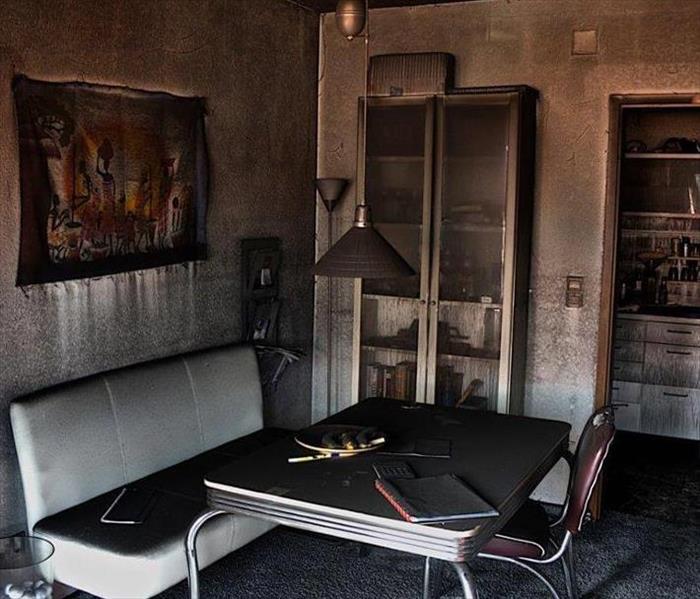 Soot is toxic! Don't mess with it.
Soot is toxic! Don't mess with it.
The word "soot" sounds so simple and harmless. To some, it conjures up images of campfires and candles, and perhaps a charming dance number from Mary Poppins.
In fact, soot is anything but simple and is certainly not harmless.
Soot includes the fine black particles, chiefly composed of carbon, produced by incomplete combustion of coal, oil, wood, or other fuels. Soot can consist of acids, chemicals, metals, soils, and dust. The common trait of soot particles is that they are extremely tiny – 2.5 micrometers or smaller in diameter. This is smaller than dust and mold, and is about 1/30 the diameter of a human hair.
This combination – extremely small size and toxic composition – is what makes soot so dangerous. It can travel deep into the lung, where the compounds it consists of can do some serious damage.
Leave the cleanup to the Professionals!
SERVPRO of Decatur/Forsyth
(217) 428-2371
Does your family have a fire safety plan?
4/30/2019 (Permalink)
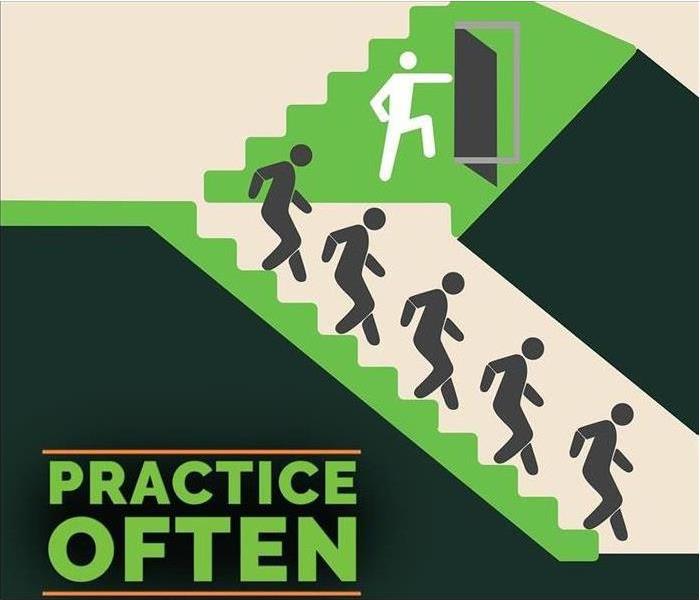 Sit down with your family and discuss a good plan of action incase there is a fire in your home.
Sit down with your family and discuss a good plan of action incase there is a fire in your home.
Many families don't have a plan of action for a house fire. Being prepared is a smart idea because when there is a house fire many people panic and don't know what each family member is doing and where they are at. Which could have a bad outcome.
Put your plan to the test: (National Fire Protection Association suggests)
- Practice your home fire escape plan twice a year, making the drill as realistic as possible.
- Make arrangements in your plan for anyone in your home who has a disability.
- Allow children to master fire escape planning and practice before holding a fire drill at night when they are sleeping. The objective is to practice, not to frighten, so telling children there will be a drill before they go to bed can be as effective as a surprise drill.
- It's important to determine during the drill whether children and others can readily waken to the sound of the smoke alarm. If they fail to awaken, make sure that someone is assigned to wake them up as part of the drill and in a real emergency situation.
- If your home has two floors, every family member (including children) must be able to escape from the second floor rooms. Escape ladders can be placed in or near windows to provide an additional escape route. Review the manufacturer's instructions carefully so you'll be able to use a safety ladder in an emergency. Practice setting up the ladder from a first floor window to make sure you can do it correctly and quickly. Children should only practice with a grown-up, and only from a first-story window. Store the ladder near the window, in an easily accessible location. You don't want to have to search for it during a fire.
- Always choose the escape route that is safest – the one with the least amount of smoke and heat – but be prepared to escape under toxic smoke if necessary. When you do your fire drill, everyone in the family should practice getting low and going under the smoke to your exit.
- Closing doors on your way out slows the spread of fire, giving you more time to safely escape.
- In some cases, smoke or fire may prevent you from exiting your home or apartment building. To prepare for an emergency like this, practice "sealing yourself in for safety" as part of your home fire escape plan. Close all doors between you and the fire. Use duct tape or towels to seal the door cracks and cover air vents to keep smoke from coming in. If possible, open your windows at the top and bottom so fresh air can get in. Call the fire department to report your exact location. Wave a flashlight or light-colored cloth at the window to let the fire department know where you are located.
Do you have pets? House fires claim many of them each year.
4/29/2019 (Permalink)
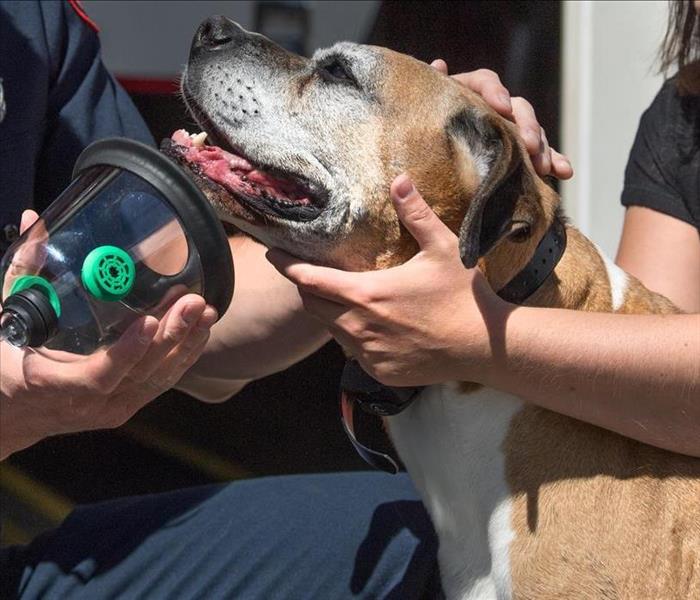 Your pets need help when a fire strikes your property!
Your pets need help when a fire strikes your property!
House fires are disastrous and dangerous. Fires can grow and spread very quickly, causing serious damage to a house in a short period of time. The heat and smoke can be harmful and deadly to both humans and pets.
Every year, about 40,000 pets die in house fires. Fires are even started by pets about 1,000 times a year. Many house fires are easily preventable, and there are many preparatory safety measures to ensure that our pets have a chance to make it out safely in the event of a fire.
Every household should already have an emergency plan for their members so that everyone knows how to get out and where to meet. Include your pets in this equation, designating specific people to be in charge of specific pets so that as many people and animals get out alive as possible.
How to prevent a fire
4/18/2019 (Permalink)
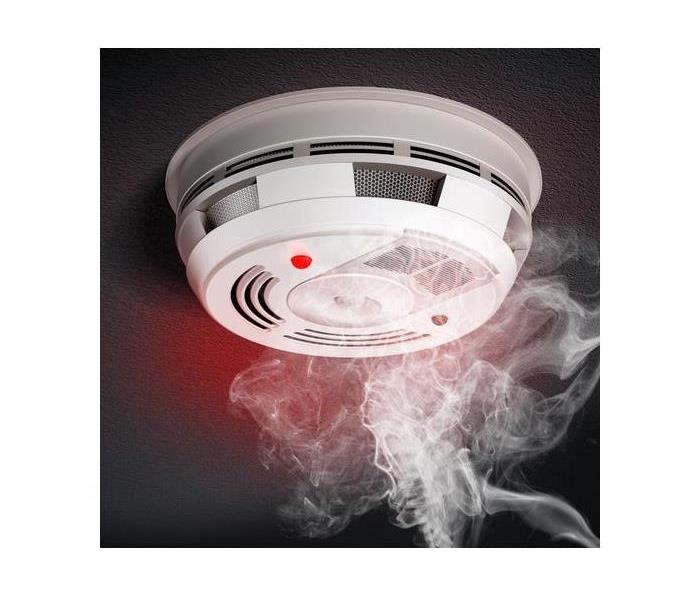 Smoke alarms save lives!
Smoke alarms save lives!
You should know how to prevent a fire from happening. Here are some top tips:
- Install fire alarms and smoke detectors. Early warning systems can help you get control of a fire before it spirals out of control. Smoke detectors can also help you get out safely. Install a smoke alarm on every level and in every room of your home, and test each alarm once a month to make sure it’s working.
- Teach children the basics of fire safety and how to prevent,prepare for and deal with a fire.
- Keep flammable items at least three feet away from anything hot. (e.g., fireplaces, space heaters, and ovens).
- Stay in the kitchen. When you’re cooking, in case something catches fire.
- Turn off appliances. Remember to shut off your stove when you’re done cooking.
- Spray down surrounding areas before having an outdoor fire. If you live in a dry climate, don’t start a fire outdoors. If you do, make sure to spray down the surrounding area in case a spark lands outside of your fire pit.
After the fire is out SERVPRO will be there to help!
4/17/2019 (Permalink)
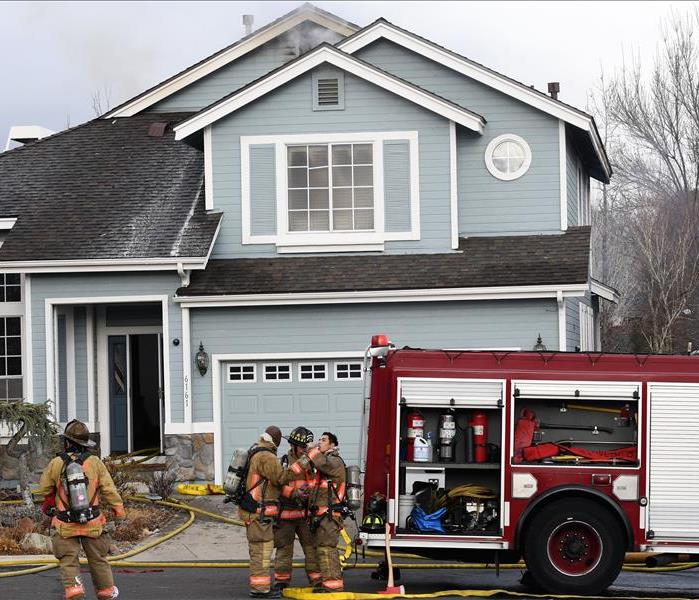 We can be ready to help after a fire damage happens. We are here to make it "Like it never even happened."
We can be ready to help after a fire damage happens. We are here to make it "Like it never even happened."
When fire damage does occur, you want someone who can repair any of the structural damage, plus get rid of any smoke stains, odors, and soot home back to its condition preloss. That is where SERVPRO of Decatur/Forsyth technicians come into the picture. We are onsite quickly to mitigate the damages, secure your property, and start emergency cleaning to items of priority. While we are there, we inspect your home, assess the damage and write preliminary estimates to give you a comprehensive restoration plan, which includes smoke and odor removal, structural cleaning, deodorizing, content restoration, repairs, and more.
Timing is critical once the fire is out. Fire damage repairs must start quickly to maximize the effectiveness and minimize damage. We are available to answer your call at any time and move into action right away. We recognize the emotional upset and trauma which you are going through, and considerately and quickly mitigate the damage on your property which is salvageable, like fixtures, household items, metals and other items. Our processes for cleaning and techniques of restoration can many times prevent replacement costs, therefore lowering total costs. Knowledge and skill are both needed for proper fire, and smoke damage restoration and our SERVPRO of Decatur/Forsyth professionals have the expertise to get the job done right.
Candle fires are more common than you might think
4/17/2019 (Permalink)
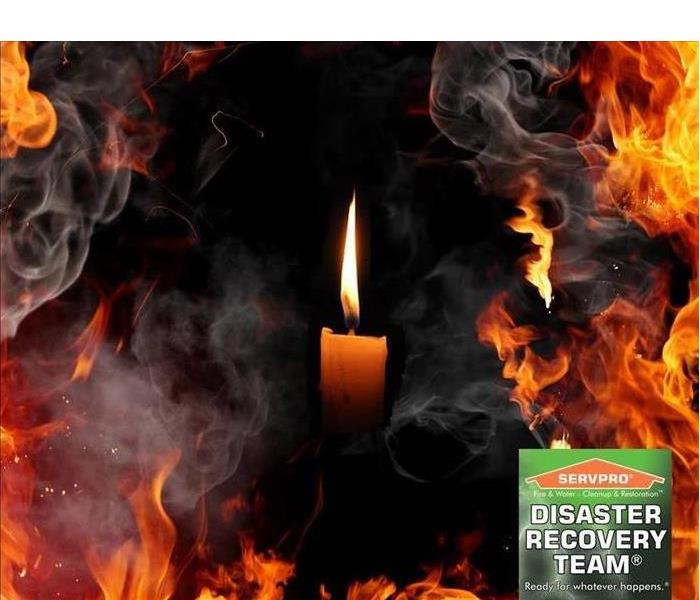 Call us (217) 428-2371
Call us (217) 428-2371
On average 25 home candle fires start every day. The simple nature of candles having an open flame is the key to why they can be so dangerous. CCFR recommends using battery operated, flameless candles.
According to the National Fire Protection Association (NFPA), more than half of all candle fires start because candles were too close to things that could catch fire.
If you use regular candles, they need to be:
• At least a foot away from anything that can burn (curtains, walls, lamps, Christmas trees, etc.)
• Attended at all times (never leave a child alone in a room with a candle)
• Used in sturdy, enclosed candleholders
• Placed in areas where they cannot be tipped over
• Avoided in homes where oxygen is used
Avoid using candles in the bedroom, where more than one-third of home candle fires begin, or other areas where people may fall asleep. In the event of a power outage use flashlights or other battery-operated power, not candles to light your home.
Avoid using candles in the bedroom, where more than one third of home candle fires begin, or other areas where people may fall asleep.
Smoke Particle are so small only a professional can clean it right!
3/20/2019 (Permalink)
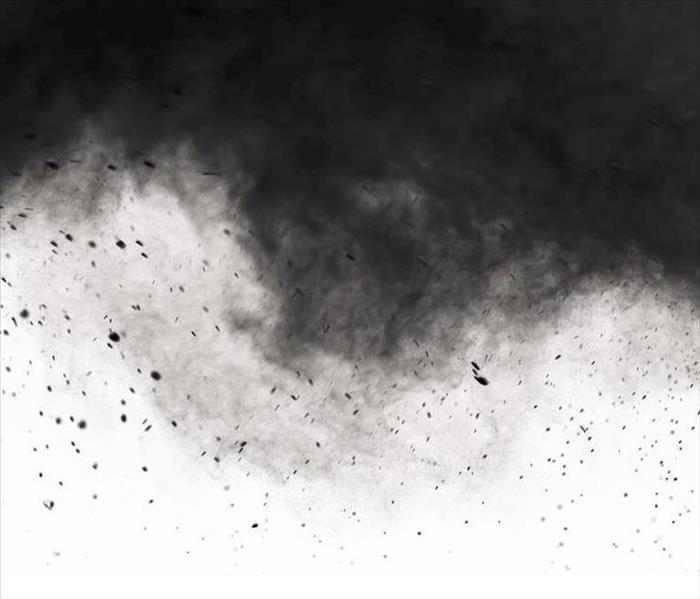 Smoke particles in the air
Smoke particles in the air
Did you Know:
If your home has been affected by smoke from a fire, it is possible that ash particles may still be present, even after the smoke has gone.
Houses, sheds and garages can be affected and the ash can leave potential health hazards. If your home has been affected by smoke, make sure you take steps to clean up any ash and protect your health and safety.
Smoke particles can be as small as .03 microns, which means they can hide in every nook and cranny. Due to size, it is very hard to remove smoke damage unless done by a professional. We are here when you need us.
SERVPRO of Decatur/Forsyth has the experience to repair and deodorize your home or business after a fire.
Father's fire damage
6/22/2017 (Permalink)
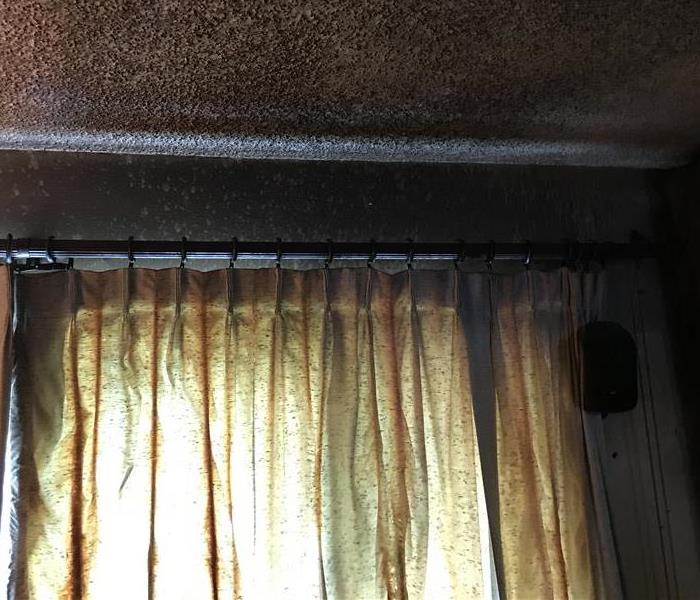 Smoke damage
Smoke damage
SERVPRO is amazing! Thank you to those who are helping clean up my Dad's place after 2 small chair fires! Amazing people with very understanding hearts! Tracy, Pam, and the rest of the team are doing fabulous! They are VERY thorough on their work and they keep the homeowner(s) in the loop with everything going on! Amazing company!
Thanks
Tracy Friel
A winter morning fire
5/22/2017 (Permalink)
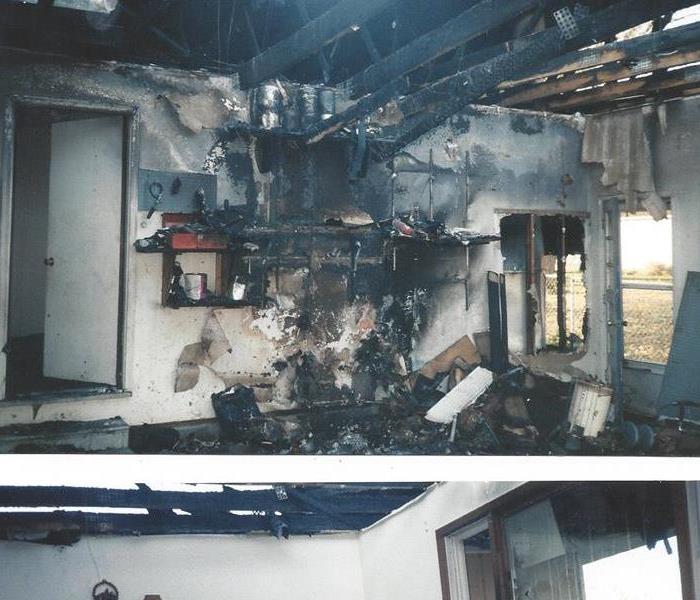 Living room fire that burned through the roof
Living room fire that burned through the roof
It was an early Tuesday morning in January. A fireplace smoldered over night and somehow reignited and caught fire in the living room.
SERVPRO of Decatur/Forsyth was on site soon after it was extinguished. SERVPRO staff began packing up emergency clothing, and other essentials to help the family.
The young family was devastated. "When we had our fire, we were devastated. We lost almost everything to either fire, smoke, or water damage."
"SERVPRO came to the house, took all of our belongings that were salvageable, cleaned them, boxed them according to the rooms they belonged and stored them until we were ready to move into our new house. Then, they brought the boxes to us and put them in their perspective rooms."
"SERVPRO was such a blessing to us in one of the worst periods in our lives by taking a big burden off of our shoulders."






 24/7 Emergency Service
24/7 Emergency Service
























